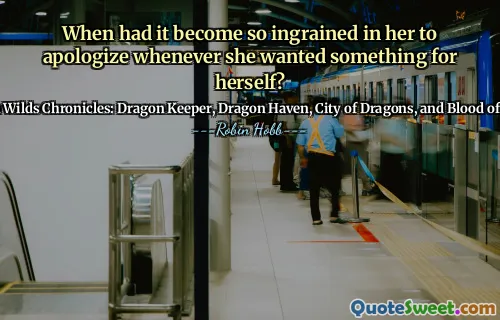
When had it become so ingrained in her to apologize whenever she wanted something for herself?
This quote encapsulates a deeply relatable and often overlooked internal struggle many individuals face — the tendency to apologize for expressing their own needs and desires. The act of apologizing in such a context is not born from genuine fault but rather from an ingrained habit, likely developed through social conditioning, upbringing, or personal experiences that have undervalued one's needs. The phrasing "when had it become so ingrained" implies a gradual process, highlighting how subtly but powerfully certain behaviors can embed themselves in our psyche. It calls attention to the introspective moment of realizing just how normalized this self-effacing behavior has become.
In particular, the notion of apologizing "whenever she wanted something for herself" touches on themes of self-worth, assertiveness, and societal expectations, especially as they pertain to women or marginalized groups who are often socialized to prioritize others’ comfort over their own needs. It questions why expressing basic desires might evoke feelings of guilt or the need for justification. There's an implicit critique of environments that discourage self-advocacy under the guise of fostering politeness or humility.
The quote encourages a reflective pause — it urges readers to assess their patterns of self-expression and to consider whether their apologies are warranted or are artifacts of internalized restraint. The emotional labor involved in silencing or minimizing oneself can contribute to feelings of invisibility or emotional depletion. Recognizing this ingrained apologetic behavior is the first step toward cultivating the confidence and self-respect necessary to ask for what one needs without apology.
Within the context of Robin Hobb's work, known for its rich character development and exploration of personal growth amidst complex social dynamics, this line gains additional resonance. It may mirror a character's journey from self-effacement toward self-empowerment, highlighting the subtle but significant ways internal change manifests. The quote invites readers to empathize with this struggle, prompting personal reflection about their own tendencies to say "sorry" unnecessarily, and inspiring a re-evaluation of how we claim space in our relationships and the world at large.






